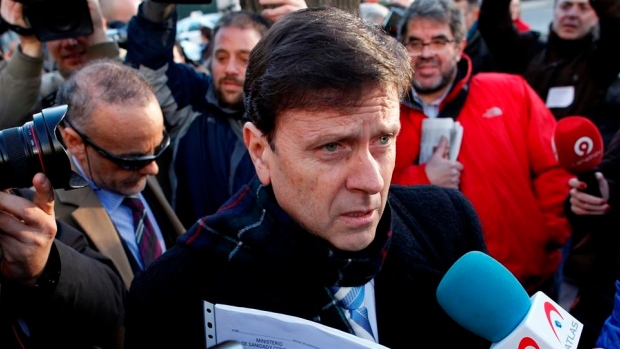Jun 14, 2016
Court: Operation Puerto to release blood bags
A Spanish court ruled Tuesday that blood bags that are key evidence in one of Spain's worst doping scandals should be handed over to authorities for investigation.
The Canadian Press

MADRID — In a decision that could lead to the public identification of dozens of athletes suspected of doping, a Spanish court ruled Tuesday that more than 200 blood bags in the decade-old Operation Puerto case should be handed over to sports authorities for investigation.
Spanish officials said, however, that no retroactive punitive sanctions could be pursued against any athletes because the statute of limitations has expired.
The Madrid Provincial Court said the bags containing blood samples and plasma should be given to the Spanish Cycling Federation, the World Anti-Doping Agency, the International Cycling Union and Italy's Olympic Committee.
The announcement came 10 years after police seized 211 coded blood bags from the Madrid clinic of sports doctor Eufemiano Fuentes, revealing a doping network involving some of the world's top cyclists.
The decision backed an appeal by lawyers for prosecuting parties against a 2013 court ruling that the bags should be destroyed for privacy reasons.
The court said Thursday's ruling "took into account that the goal is to fight against doping, which goes against sport's ethical values."
Not ordering the bags to be made available would have "generalized the danger of other sports people being tempted to dope themselves and sent a negative social message that the end justifies the means," the court said.
The 2013 order to destroy the blood bags outraged the sports community. Spain's anti-doping agency, the International Cycling Union and the World Anti-Doping Agency were among the entities that appealed.
More than 50 cyclists were originally linked to the case. Among those eventually suspended were former Tour de France winner Jan Ullrich, Spanish Vuelta champion Alejandro Valverde and Ivan Basso, who later confirmed that his blood was among the frozen samples found.
Fuentes said during the 2013 trial that he also worked with athletes from other sports, but the judge back then said he didn't have to name anyone who was not implicated in the cycling case.
Speculation has been rife that the release of the bags, which have been stored at a lab in Barcelona, could stir up another scandal if identities of new athletes are revealed.
"WADA is very pleased with the decision of the court to release the blood bags," WADA President Craig Reedie told The Associated Press. "We will now be speaking to the other parties who appealed in the case to decide how to proceed. We have to see what the implications are regarding the statute of limitations."
An eight-year WADA statute was in place in 2006 when the scandal first broke, and the period was recently extended to 10 years.
"We can't ban or fine eventual dopers from Operation Puerto at this point," said Jose Antonio Del Valle, legal adviser for the Spanish Cycling Federation, noting the first police raid on Fuentes' clinic took place in May 2006. "Back then, Spanish law's statute of limitations was three years, and four worldwide. Since then, WADA has expanded it to four, eight and now 10 years, but even the current one has been exceeded."
With sanctions ruled out, anti-doping authorities will have to settle for public identification of offenders.
"This sentence comes way too late, a decade after the fact," Spanish Cycling Federation president Jose Luis Cerron said. "It should have been resolved a long time ago. Most of the athletes that were competing back then would presumably be retired by now, so we wouldn't even be able to punish them at this point."
For years, WADA asked Spanish authorities to provide the agency with access to the bags so that any doping violations could be pursued.
"We are dismayed that it took so long to receive the decision but we will now partner with the other parties that have been granted access (to the blood bags), to determine our legal options vis-a-vis analyzing the blood and plasma bags," WADA director general David Howman said.
Fuentes had admitted participating in organized doping along with a former cycling director and was handed a one-year suspended sentence for endangering public health in the original verdict in 2013. On Tuesday, the court cleared him of all charges on the basis that blood transfusions couldn't be deemed a medical treatment.
Spanish athletes and officials also complained that the lack of closure on the case has further damaged the country's image in the fighting doping.
"Operation Puerto caused horror to our sport and to the image of the country," Spanish Olympic committee chief Alejandro Blanco said recently. "We've been dealing with this for 10 years, and it feels like it could be other 20."
___
Oller reported from Barcelona. AP Sports Writer Stephen Wilson in London and Associated Press writer Barry Hatton in Lisbon, Portugal, contributed to this report.
